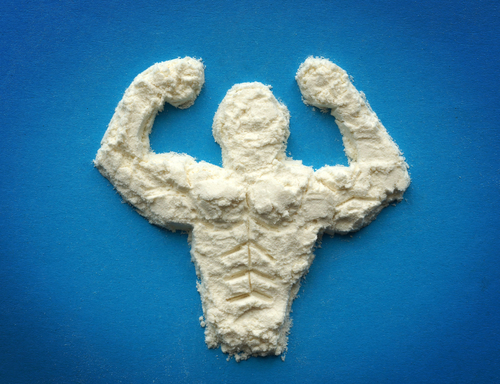Is Too Much Protein Bad For You?
Short answer
Unless you are engaged in a very active lifestyle, having an excess of proteins in your daily diet can be quite disastrous to your health.
Harmful to your health. A few benefits may be associated, but the bad outweighs the good. Moderation is extremely important.
View Full Grading System
Category 'A'
Very healthy and numerous health benefits. Side effects are rare. Things rated an 'A+' are typically necessary for survival (for example, water).
Very healthy and numerous health benefits. A few harmful qualities may be associated, but only under certain circumstances such as an allergic reaction.
Very healthy and numerous health benefits. Harmful qualities may be associated, but aren't usually serious.
It is important to note that even the best things in life can become bad in immoderate amounts. So, although something may be rated an 'A+', overconsumption/overdoing can bring unwanted effects.
Category 'B'
Very beneficial to your health. Things rated a 'B+' may have a few harmful qualities to pay attention to.
Overall beneficial to your health. Things rated a 'B' may have some harmful qualities to pay attention to.
More beneficial to your health than not. However, harmful qualities are most likely associated and shouldn't be overlooked.
The main difference between category 'A' and category 'B' is the harmful qualities typically present in 'B' items. Serious side effects are usually uncommon, but are still possible and should be taken note of.
Category 'C'
Both beneficial and harmful qualities associated. Things rated a 'C+' are typically a bit more on the beneficial side. Still, moderation is important.
A fairly even ratio of beneficial and harmful qualities. Moderation is important. Very general topics that can lean towards both sides of the spectrum will be placed here as well. Rice, for example, can be good or bad depending on the type.
More harmful than beneficial. Side effects are common, especially when consumed/done excessively. Moderation is very important.
Category 'C' usually denotes to both good and bad qualities. When it comes to this category, it is important to keep this word in mind: moderation.
Category 'D'
Harmful to your health. Although benefits may be associated, the bad most likely outweighs the good. Moderation is very important.
Harmful to your health. A few benefits may be associated, but the bad outweighs the good. Moderation is extremely important.
Harmful to your health. Very few, if any, benefits are present. Things in this category should be avoided as much as possible.
Category 'D' is typically for things that are more harmful than beneficial. While consuming/doing something unhealthy once in a blue moon shouldn't hurt, we definitely recommend eliminating 'D' items as a regular part of your routine/diet.
Category 'F'
Category 'F' is for things that fail to bring anything beneficial to the table, and are very harmful to your health. We recommend completely avoiding anything in this category. Long-term side effects of 'F' items are usually very serious.
Category 'N'
'N' stands for neutral. Things placed into this category are generally (a) neither good nor bad for you, or (b) lack the necessary evidence to reach any conclusions.
Long answer
Taking in too many proteins can lead to serious health consequences. Among these include kidney malfunction, heart disease, triggering an attack by pathogenic bacteria and yeast (Candida albicans), increased levels of amino acids and ammonia in the body, etc. The recommended limit for the average adult male is 56 grams of protein per day, while the average adult female should consume 46 per day. Of course, this number may fluctuate depending on various factors such as weight and activity level. Another problem associated with high-protein diets (diets consisting of over 200 g per day) is that the body converts excess protein into calories. This, in turn, may lead to increased weight gain. It should be noted that a high protein diet in tandem with a heavy workout will increase weight gain in the sense of gaining more muscle. However, people who consume high amounts of protein without the necessary intense workout accompanying it may find themselves facing obesity.
An additional adverse effect of consuming a large quantity of protein is developing a nutrient deficiency. People on high protein diets often forget to consume enough of the other necessary vitamins and minerals, putting themselves at risk for a variety of health problems. One particular study was done noting a possible relation between excess protein intake and prostate cancer, but further research is needed for this to be conclusive. Add to the above information that Americans consume at least twice as much protein as the recommended daily limit and you may see this is cause for real concern. However, you should take heart. Most problems caused by high amounts of protein are in conjunction with getting the protein from sources that contain high levels of fat.
Bottom line: If you consume a lot of proteins while being inactive and neglecting other nutrients, you may very well find yourself facing serious health problems. On the other hand, a high protein diet while maintaining a balanced intake of other nutrients and leading an active lifestyle most likely will not have any serious consequences.
Possible short-term side effects
Possible long-term side effects
Healthier alternatives
- keeping a balanced diet / nutrient intake
Please turn your Ad Blocker off to see this content. Thank you!
Thank you for your feedback!
Written by Jeff Volling
Published on: 01-01-2016
Last updated: 12-10-2016
Thank you for your feedback!
Written by Jeff Volling
Published on: 01-01-2016
Last updated: 12-10-2016

 Approved by
Approved by 















